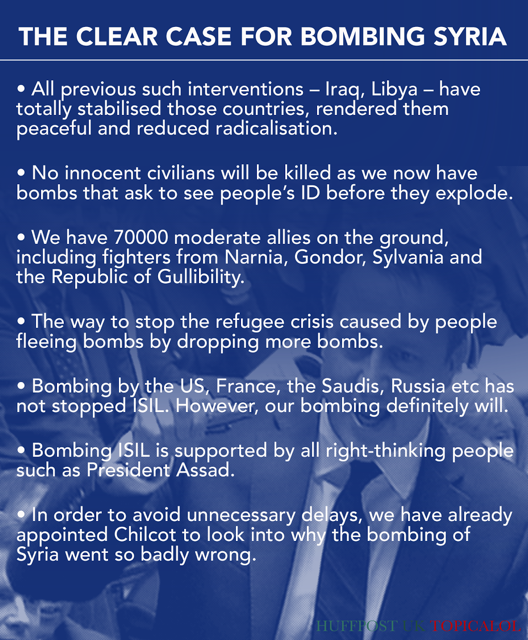Ahead of vote, Prime Minister David Cameron described Labour leader Jeremy Corbyn as ‘terrorist sympathizer’ for opposing bombing campaign
Update (6:40 PM EDT): Following day-long debate, MP’s approve aistrikes for Syria
Despite widespread warnings and voiced opposition against such a move in recent weeks , the British Parliament on Wednesday evening voted to approve military airstrikes inside Syria.
As the Guardian reports:
MPs voted 397 to 223 in favour of sending RAF Tornados into the skies over Syria, after an all-day debate in parliament. An estimated 67 Labour MPs backed the government in defiance of the party leader, Jeremy Corbyn.
In a day of soul searching, recrimination and often heartfelt speeches, it became clear David Cameron was guaranteed a clear overall majority. More than 40 Labour MPs and the minor parties agreed Britain had to act to address the threat posed by Isis in both Syria and Iraq, in light of the Paris terror atrocities.
The prime minister’s majority was bouyed by the decision of the Democratic Unionists and the Liberal Democrats to support strikes.
In response to the vote, the UK-based Stop the War Coalition which lobbied hard against Cameron’s push to bomb Syria said it was both “angry and disappointed” with the vote, but vowed to continue its campaign. “None of the wars launched by the UK and US from Afghanistan in 2001, through Iraq in 2003 to Libya in 2011, has yet ended,” the group stated. “Millions still suffer from those decisions – today’s vote will add millions more.”
Following the vote, Corbyn expressed dismay, stating, “British service men and women will now be in harm’s way and the loss of innocent lives is sadly almost inevitable.” Corbyn released his complete statement in a tweet
British service men and women will now be in harm’s way and the loss of innocent lives is sadly almost inevitable.
Earlier:
For his opposition to launching British airstrikes against the Islamic State (ISIS) in Syria, Labour Party leader Jeremy Corbyn has been branded a “terrorist sympathizer” by UK Prime Minister David Cameron, who refused to apologize for the slur even after it engendered widespread outrage.
The British Parliament on Wednesday will debate for close to 11 hours and then vote on whether the UK joins others such as the U.S., France, and Russia in bombing targets in Syria. The ‘Yes’ side is expected to prevail.
On the eve of the vote, Cameron reportedly warned rebel Conservative MPs that to vote ‘No’ on the motion would be to “walk through the lobbies with Jeremy Corbyn and a bunch of terrorist sympathizers.”
Corbyn himself struck back immediately, saying the comment “demeans” the office of prime minister.
“The prime minister’s attempt to brand those who planned to vote against the government as terrorist sympathizers both demeans the office of the prime minister and I believe undermines the seriousness of deliberations we are having today,” he said at the Commons on Wednesday.
Labour MP and Corbyn ally Clive Lewis, himself a veteran of the war in Afghanistan, told the BBC on Wednesday: “For myself, as someone who served in Afghanistan, served my country, to be described as a terrorist sympathizer….it’s beneath contempt. I think what it’s actually done is damage his argument. I think it shows that his arguments are weak.”
Meanwhile, people took to social media to further criticize Cameron’s remark. According to the BBC, on Wednesday morning, the hashtag #TerroristSympathiser was almost five times as popular as the more neutral #SyriaVote.
On Tuesday evening, for the second time in less than a week, thousands of people gathered in the streets of London to protest what they described as an “ever-widening war” that “risks increasing the terrorist threat both to the peoples of the Middle East and to Britain.”
A poll by YouGov for The Times shows that public support for bombing ISIS in Syria has dropped sharply in just two weeks, with less than half of voters now in favor of airstrikes.
As the Daily Mail reports, a YouGov survey carried out days after the November 13 attacks in Paris showed 59 percent of the public approved of the UK taking part in airstrikes against ISIS in Syria. But the new poll reveals that only 48 percent are now in favor, while the proportion against has increased by 11 points to 31 percent.
In his speech Wednesday, Corbyn said “14 years of disastrous wars in the wider Middle East” show why the UK should not expand its military campaign into Syria.
“The specter of Iraq, Afghanistan and Libya looms over this debate,” said the longtime anti-war activist. “To oppose another reckless and half-baked intervention isn’t pacifism. It’s hard-headed common sense.”
Corbyn argued: “It’s wrong for us here in Westminster to see a problem, pass a motion, and drop the bombs pretending we’re doing something to solve it. That’s what we did in Afghanistan, Iraq and Libya. Has terrorism increased or decreased as a result?”
(1) Stephen Fry is a British actor and comedian. Chilcot is the enquiry into the Iraqi war already 5 years late delivering its conclusions.










